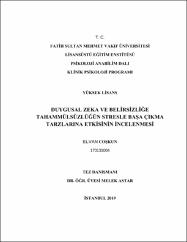| dc.contributor.advisor | Astar, Melek | |
| dc.contributor.author | Coşkun, Elvan | |
| dc.date.accessioned | 2019-08-02T08:13:30Z | |
| dc.date.available | 2019-08-02T08:13:30Z | |
| dc.date.issued | 2019 | |
| dc.identifier.citation | COŞKUN, Elvan, Duygusal Zeka ve Belirsizliğe Tahammülsüzlüğün Stresle Başa Çıkma Tarzlarına Etkisinin İncelenmesi, Fatih Sultan Mehmet Vakıf Üniversitesi Lisansüstü Eğitim Enstitüsü Psikoloji Anabilim Dalı, Yayımlanmamış Yüksek Lisans Tezi, 2019. | en_US |
| dc.identifier.uri | https://hdl.handle.net/11352/2901 | |
| dc.description.abstract | Bu çalışmanın amacı, duygusal zeka ve belirsizliğe tahammülsüzlüğün, stresle başa çıkma tarzlarına etkisinin incelenmesidir. Çalışma İstanbul’da çeşitli devlet ve özel üniversitelerde öğrenim gören 349 öğrencinin gönüllü katılımı ile gerçekleştirilmiştir. Araştırma kapsamında katılımcıların kişisel bilgilerini elde etmek amacıyla demografik bilgi formu, duygusal zeka düzeylerini belirlemek amacıyla Schutte Duygusal Zeka Ölçeği, belirsiz durumlar karşısındaki tutumlarını incelemek amacıyla Belirsizliğe Tahammülsüzlük Ölçeği ve stresli durumlar karşısında başvurdukları stratejileri incelemek amacıyla Stresle Başa Çıkma Tarzları Ölçeği kullanılmıştır.
Ölçeklerden elde edilen toplam puanlar ile alt boyut puanları hesaplanmış ve çalışmanın hipotezlerini test etmek için Bağımsız Örnek t-Testi, Tek Yönlü Varyans Analizi (ANOVA), Korelasyon ve Regresyon analizleri uygulanmıştır. Araştırmanın bulgularına göre; duygusal zeka, belirsizliğe tahammülsüzlük ve stresle başa çıkma tarzları arasında istatistiksel olarak anlamlı ilişkiler bulunmuş ve duygusal zekanın problem-odaklı başa çıkma yöntemlerini olumlu yönde etkilediği, belirsizliğe tahammülsüzlüğün ise duygu-odaklı başa çıkma yöntemlerini etkilediği görülmüştür. Sonuçlar ilgili literatür ışığında tartışılmıştır. | en_US |
| dc.description.abstract | The aim of this study is to investigate the effect of emotional intelligence and intolerance of uncertainty on the ways of coping with stress. This study is held on a sample of 349 students who study in either public or private universities and participated voluntarily. In order to obtain personal information from participants, demographic information form iss used. In order to identfy participants’ emotional intelligence levels, Schutte Emotional Intelligence Scale is used. In order to identify participants’ attitudes toward uncertain situations, Intolerance of Uncertainty Scale is used. In order to examine which strategies participants use when they encounter stressful situations, Ways of Coping Inventory is used.
The total and the sub-dimension scores which are obtained from scales are examined. In order for hypothesis testing, Independent Sample t-Test, One Way Analysis of Variances (ANOVA), Correlation and Regression analyses are carried out. According to the results of this study, there are statistically significant relations among emotional intelligence, intolerance of uncertainty and the ways of coping with stress. It is found that emotional intelligence has a positive effect on the problem-focused coping strategies and intolerance of uncertainty has an effect on the emotion-focused coping strategies. The results are discussed in the light of related literature. | en_US |
| dc.language.iso | tur | en_US |
| dc.publisher | Fatih Sultan Mehmet Vakıf Üniversitesi, Lisansüstü Eğitim Enstitüsü | en_US |
| dc.rights | info:eu-repo/semantics/openAccess | en_US |
| dc.subject | Duygusal zeka | en_US |
| dc.subject | Belirsizliğe tahammülsüzlük | en_US |
| dc.subject | Stresle başa çıkma tarzları | en_US |
| dc.subject | Emotional intelligence | en_US |
| dc.subject | Intolerance of uncertainty | en_US |
| dc.subject | Styles of coping with stress | en_US |
| dc.title | Duygusal Zeka ve Belirsizliğe Tahammülsüzlüğün Stresle Başa Çıkma Tarzlarına Etkisinin İncelenmesi | en_US |
| dc.type | masterThesis | en_US |
| dc.contributor.department | FSM Vakıf Üniversitesi | en_US |
| dc.relation.publicationcategory | Tez | en_US |
| dc.contributor.institutionauthor | Coşkun, Elvan | |



















